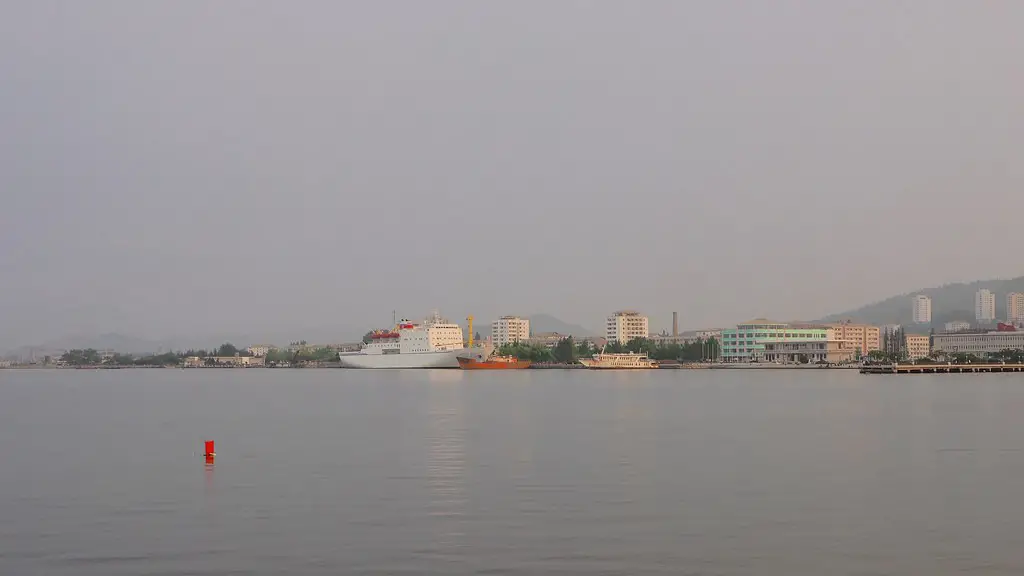Military Support
North Korea possesses one of the largest standing armies in the world. According to the Military Strength Index, they are ranked 18th out of states with the largest military forces. The forces are estimated to be around 1.19 million active personnel and close to 5.3 million reserve personnel, with most of these serving in the army, navy and air force. They also possess a large number of missiles and artillery pieces. North Korea has a long-standing military alliance Russia and China, with these countries providing much of the military equipment and training for the North Korean armed forces.
Chinese military support for North Korea includes providing weapons, tanks, aircraft, and military equipment. Russia has provided weapons, supplies, and technical support for North Korea. With the two countries providing important military technologies and advanced military equipment, North Korea has been able to acquire more sophisticated and powerful weapons than it would have been able to acquire on its own. Furthermore, the two countries have provided maintenance and spare parts for North Korean weapons, which are usually not supplied by technology exporters.
Economic Support
Despite criticized by many in the international community, China, continues to offer significant financial assistance to North Korea, sustaining the country’s weak economy, as well as its failing infrastructure. North Korea has become heavily dependent on China for its imports and exports, and is heavily reliant on Chinese trade and investment. In 2014, China accounted for over 90% of North Korea’s total trade and was responsible for nearly all the $7.6 billion that North Korea imports annually.
Furthermore, China has provided North Korea with key investments in infrastructure, development, and energy production. In 2017, China invested over $2 billion to expand and modernize the port of Rajin as part of infrastructure investments linked to the development of the Rason Special Economic Zone. This was followed by the announcement of a $3 billion investment to build a light railway connecting the region to the Chinese border town in 2018. Though specific economic figures are difficult to come by, it is evident that China has been North Korea’s most important trading partner and has provided the country with important investments.
Diplomatic Support
North Korea has received strong diplomatic support from China and Russia. China has offered diplomatic support by opposing the sanctions imposed by the United Nations Security Council and by providing diplomatic protection in international forums. However, the most noteworthy diplomatic support received by North Korea has been from Russia, with the Russian government having been, as of 2018, the only nation to veto Security Council resolutions authored by the United States, United Kingdom and France, proposing further sanctions.
In addition, Russia has consistently provided diplomatic support for North Korea in the United Nations General Assembly, often supporting them on human rights and nuclear issues. Russia has even proposed to host talks on resolving the long running situation on the Korean peninsula, and has argued for the lifting of sanctions, a move opposed by the United States and its allies. As such, Russia’s support of North Korea has been an important factor in thwarting attempts to isolate the country.
Cultural Support
China and Russia have also provided North Korea with significant cultural and diplomatic support, particularly in the form of cultural exchanges. For example, in 2008, China hosted the North Korean musical group, the Choir of the Nation, in Beijing to celebrate Chinese-North Korean relations over the past 60 years. This event was held in conjunction with a visit by then North Korean leader Kim Jong-il to Beijing. This event drew a large number of Chinese people who expressed their support for North Korea.
Furthermore, North Korean students have been sent to study in China and Russia. This is an important factor in contributing to North Korean-Chinese relations as these students get a chance to experience the culture and customs of these countries. A number of North Korean art groups have also visited both China and Russia, allowing their citizens to experience North Korea’s culture and traditions.
Social Support
Open support for North Korea on social media has been limited, given the intense international criticism directed at the country. Nevertheless, some North Korean citizens have expressed their support for the country online, often through private platforms or through social media accounts hosted in other countries. These accounts often feature images and messages of support for the North Korean leadership.
For instance, in 2019, a number of North Koreans posted images of themselves wearing Kim Jong-un propaganda pins on a Russian social media platform. It is believed that these posts were made with the intention of expressing support for the North Korean leadership. Additionally, North Korean exiles living abroad have expressed their support for the North Korean government, usually through social media accounts. Through these accounts, North Korean exiles can disseminate information about the North Korean government and express their support for the leadership.
Influence on Other Nations
China and Russia’s support for North Korea has played an important role in how other countries view the country. By supporting them, China and Russia have caused other countries to take a more lenient stance towards North Korea and have given the country diplomatic protection when needed.
In particular, China’s support has helped North Korea to stave off criticism from international bodies such as the United Nations Security Council, and has allowed it to continue on its current policies. In addition, Chinese and Russian support for North Korea has caused other countries to be more hesitant in criticizing North Korea and their strategies, which has in turn enabled North Korea to remain in its current position.
Breaking the Cycle
Since the Korean War, the US has sought to break the dependence of North Korea on China and Russia in order to further entrench democracy and economic independence from the two resistant regimes. The US government has launched several initiatives with this aim in mind, including the Obama administration’s Strategic Patience approach and its outreach to regional actors such as South Korea, Japan and China.
However, this strategy has failed to break the cycle of dependence between North Korea and these two countries. The US has been unable to convince China and Russia to completely abandon their support for North Korea, and continues to struggle to achieve a denuclearized Korean peninsula.
International Community’s Response
In response to China and Russia’s continued support for North Korea, the international community has taken steps to isolate the country and to apply pressure in order to encourage it to change its policies and comply with international law. This has included the imposition of sanctions on North Korean individuals and organizations, as well as on Chinese and Russian companies and individuals who provide assistance to North Korea.
Furthermore, the United Nations Security Council has imposed multiple sanctions resolutions that target North Korea’s weapons programs, banking activities and trade relations with other countries. These sanctions, however, have had limited success in preventing North Korea from receiving support from China and Russia.
Negotiation Efforts
The United States and its allies have sought to use negotiations with North Korea as a way of convincing China and Russia to end their support for the country. During the Trump administration, the US sought to persuade China and Russia to support a negotiated settlement to the situation on the Korean Peninsula, with the goal of forcing North Korea to abandon its nuclear weapons program and to open up to economic and political reforms.
In spite of this, China and Russia were not willing to completely abandon their support for North Korea, opting instead to focus on the possibility of a gradual series of confidence-building measures and negotiations. In spite of this, however, North Korea has remained largely reliant upon these two countries for support.
Re-Thinking the Approach
It is clear that China and Russia’s support for North Korea has been key in sustaining the country in the face of international pressure and criticism. As such, it seems that the US should re-think its approach towards resolving the situation on the Korean Peninsula. A better strategy would be to focus on persuading China and Russia to reduce their support for North Korea, while also seeking to engage in direct negotiations with the North Korean government. By doing so, the US may be able to achieve a more peaceful resolution to the situation on the Korean peninsula.


